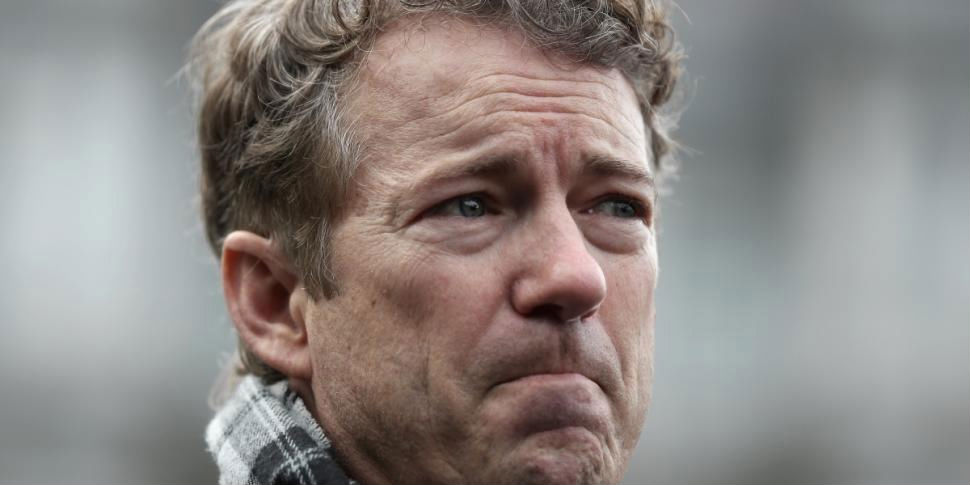[protected-iframe id=”5c54bda36377f0eb55c8cf7dfc5a7a66-46934866-60066902″ info=”//www.spreaker.com/embed/player/standard?autoplay=false&episode_id=4972022″ frameborder=”0″ scrolling=”no”]
Videos by Rare
Left and right now accuse Rand Paul of becoming a “flip-flopper.” On Monday, the Washington Post’s David A. Fahrenthold showed how Paul has appeared to evolve on a number of issues. The Weekly Standard’s John McCormack gave Paul the same treatment. The senator will undoubtedly have to answer for positions that have become confusing for some.
But it is on the issue of foreign policy—specifically Paul’s recent call for military action against ISIS—that has many claiming the senator has done a 180.
He hasn’t. Paul’s comments about ISIS are entirely consistent with what he’s said in the past.
Calling Rand Paul a flip-flopper on foreign policy actually says more about his critics than it does the senator.
The Paul pile-on reminds us that the political class currently can’t comprehend or compute anything between the polar extremes of interventionism and “isolationism.” It’s a narrative they’ve created and now that they’re presented with something different, they simply don’t know what to do with it.
A short history lesson: When Rand Paul opposed intervention in Libya in 2011, most in the media labeled that position “isolationist.” When he tried to end foreign aid to Egypt in 2013, that too was labeled isolationist. When he opposed intervention in Syria last year, again, it was called isolationism. When Paul has said that the Iraq war was a mistake, many called that isolationism too.
So when Paul said that ISIS warranted U.S. military action, Beltway pundits and pols were quick to pounce on his supposed “metamorphosis” from isolationism. Hawks felt vindicated, as if Paul saying we needed to take on ISIS somehow justified their entire worldview (despite the fact that Paul has repeatedly and forcefully opposed their constant interventionism, even in his call for action against ISIS). Some liberals and libertarians favorable to Paul’s foreign policy perhaps really wanted him to be something closer to isolationism and were disappointed that he obviously wasn’t.
The narratives created by Paul foes and friends alike do not reflect what the man has actually said or portrayed himself as.
Paul has never said that a genuine threat does not deserve a military response. He has said time and again that sometimes war is necessary, but that it should be entered into reluctantly and decided upon constitutionally.
This is exactly how he’s addressed ISIS too.
Paul calls his foreign policy “realist.” Part of Paul’s realism is that he believes America’s foreign policy has been a primary contributor to our current problems abroad, including ISIS. Paul wrote a Wall Street Journal op-ed making this case last month.
The Washington consensus seems to be that U.S. foreign policy does not create or contribute to the rise of groups like ISIS (or to the degree that it might, both parties blame the other for doing it), and anyone who suggests as much is most certainly an isolationist.
So when Paul, the alleged isolationist, wrote a column for Time calling for military action, the media trumpeted this “flip-flop,” specifically citing his Wall Street Journal op-ed as proof of his inconsistency.
But there was nothing inconsistent about either column unless you genuinely believe Paul to be an isolationist—a position he explicitly rejects in both columns.
Republican hawks and liberals alike have been eager to paint Paul as something he’s not because it serves their purposes, and the media has been a willing accomplice, sometimes out of ignorance. As James Antle recently noted at The National Interest:
In addition to the many camps with a vested interest in Paul’s failure, much of the media has had little past exposure to anything approaching noninterventionism. It just isn’t in the vocabulary of many reporters, including some who are genuinely trying to be fair, attempting to parse his statements now.
If the only acceptable sides of a foreign policy debate belong to President Obama on one hand and former vice president Dick Cheney on the other, Paul certainly looks like an odd duck.
Democrat and Republican leaders both want to intervene constantly—in Libya, Syria, in Iraq. Their primary disagreements are about how soon to intervene, how hard and how long.
Rand Paul says we should intervene less. He has never said we should never intervene. To Washington, saying we should intervene less is tantamount to saying we should never intervene at all.
The political class can’t seem to understand anything, or anyone, that might fall between these two extremes.
That’s their problem, not Rand Paul’s.
Disclosure: I co-authored Senator Rand Paul’s 2011 book The Tea Party Goes to Washington.



